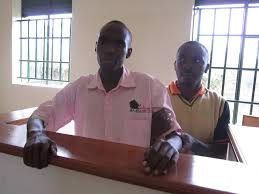The United Nations Special Rapporteur on the Promotion and Protection of the Right to Freedom of Opinion and Expression, Prof David Kaye; the Special Rapporteur on Freedom of Expression and Access to Information in Africa, Advocate Pansy Tlakula, as well as national, regional and international non-governmental organizations, including Media Rights Agenda (MRA), are seeking to join proceedings of a criminal defamation suit filed by a Ugandan journalist, Mr. Ssembuusi Ronald, at the East African Court of Justice (EACJ) in Arusha, Tanzania.
Mr Ssembuusi, who is now deceased, is challenging the legality of the offence of “criminal defamation” and hearing for the case which has now drawn international attention began on July 31, 2015.
The case was presided over by a panel of five judges, led by the Principal Judge of the Court, Justice Monica Mugenyi in the First Instance Court. With the complainant being deceased, Mr Ssembuusi’s lawyer and representative were directed to file a motion substituting the deceased with the duly appointed legal representative. The court was therefore adjourned to allow the process be finalized.
The deceased filed a case at the East African Court of Justice in December 2014, challenging his conviction and one year jail term sentence by the Kalangala Magistrates Court on charges of criminal defamation. The complainant, Mr Ssembuusi who died in January 2015 after filing his case with the EACJ worked as a former CBS FM radio correspondent in the Kalangala district, southern Central Uganda.
In his affidavit, Mr Ssembuusi contends that the continued use by the Uganda government of sections 179 and 180 of the Penal Code Act of Uganda which provide for the offence of criminal defamation is a violation of the fundamental and operating principles of the East African Community Treaty. He is requesting that the Court determine whether or not these sections of the Penal Code Act are justifiable restrictions on the right to freedom of expression, media and access to information that are protected by the Treaty for Establishment of East African Community.
The late Mr Ssembuusi is represented by Catherine Anite and Nicholas Opiyo of Oasis Advocates while the Attorney General of Uganda is represented by State Attorneys Jeffrey Atwine, Harriet Nalukenge and Ojambo Bichachi. Despite the demise of the complainant, his lawyer, Anite has assured journalists in Arusha that the case will go on because the court allows for appointment of a representative.
The United Nations and the African Union, whose interests in this case have peaked, are ready to provide insights as to how the AU and UN define the suitable outlines of government restrictions on speech and press in the context of defamation laws, and will assist the Court in assessing the statute’s compatibility with the stipulated principles in the EAC Treaty. In a joint application filed on July 30th, the special rapporteurs of both organizations said they will provide the Court with expert interpretation on international law from the perspective of the AU and UN.
A number of organizations are seeking to intervene in the defamation case as Article 40 of the EAC Treaty allows a Partner State, the Secretary General or a resident of a Partner State who is not a party to a case before the Court to ask to intervene with the aim of supporting or opposing the arguments of a party to the case. The organizations are seeking to improve the court’s view and understanding of the right to freedom of expression, press and access to information by supplementing it with a comparative and international law perspective which will in turn “enhance the Court’s assessment of Uganda’s criminal defamation law”
“This is very encouraging, we hope the court will accept the request and allow these organizations and individuals to contribute towards enriching the jurisprudence of freedom of expression and the media in Uganda,” said Robert Ssempala, the National Coordinator, Human Rights Network for Journalists-Uganda.




